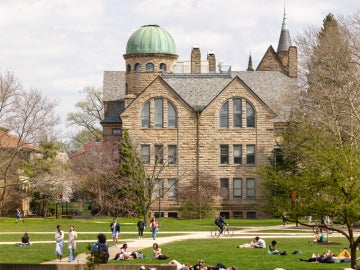Amanda Schmidt Receives Fulbright U.S. Scholar Program Award
May 26, 2019
Hillary Hempstead

Associate Professor of Geology Amanda Schmidt
Photo credit: Jennifer Manna
Associate Professor of Geology Amanda Schmidt has received a Fulbright U.S. Scholar Program award to conduct research in Sichuan, China.
The U.S. Fulbright Scholar Program offers nearly 470 teaching and research awards in more than 125 countries. Opportunities are available for a range of professionals, including college and university faculty and administrators, as well as artists, journalists, scientists, lawyers, independent scholars, and others.
Schmidt applied for the Fulbright in order to pursue a new research project that stemmed from a previous project she was working on in Southwestern Sichuan. She will undertake the research during her sabbatical in the ’19-20 academic year.
“When I was thinking about what to do for my sabbatical, I knew I wanted to spend the year with my family in Chengdu, Sichuan, China, and this interdisciplinary project, the Fulbright funding opportunity, and my sabbatical plans all lined up nicely,” says Schmidt.
The research Schmidt will conduct is an outgrowth of a previous project that focused on determining how long-term indigenous land use practices and modern communist policies interacted to create the landscape and erosional patterns seen today in a small watershed in Southwest Sichuan Province.
Schmidt explains: “We mapped a grey clay in the valley, which is an environment that we wouldn't expect to find clay deposits. Grey clay deposits typically signify a lake or very marshy environment, but to have a marshy environment in this location, you need to have a pretty big lake. The preliminary dates we have for the clay overlap with archaeological sites that would have been underwater if the lake existed at that time.
‘‘The goal of my Fulbright-supported project is to understand if the lake existed, and, if so, how big it was and when it was there. Doing this will also require determining when and how it drained and what mechanism dammed it. The data will contribute to archaeology, geography, and geology of the region.”
Schmidt says she is most looking forward to being in China for an extended period of time, which will allow her to deepen relationships with collaborators she has worked with for many years.
“I normally am in and out of China fairly quickly when doing field work, so being there for an entire year gives me a chance to give back a little bit in addition to furthering my research,” says Schmidt. “I hope to run a writing seminar with my collaborators' graduate students as part of the process of mutual exchange that Fulbright values so much.”
Once she returns from China, Schmidt plans to analyze the data she will have collected in the field and also write about the findings.
“Although I'll be sad to be away from Oberlin for the year, this is a really exciting opportunity for my research. My kids and husband are also excited to embark on this new adventure of living overseas.”
You may also like…
Oberlin Launches Critical AI Studies Minor in Fall 2026
With a solid foundation in both science and the humanities, this minor ensures students to understand and be able to analyze the ethical, cultural, environmental, political, economic, technological, and labor effects of AI.
Chudi Martin Jr. ’24 Earns Prestigious Gates Cambridge Scholarship
Chudi Martin Jr. ’24 earns prestigious Gates Cambridge Scholarship.
Oberlin Named a Top Producer of Fulbright Students for 2025-26
Oberlin College and Conservatory was named a Top Producer of Fulbright students for the 2025-2026 academic year.


